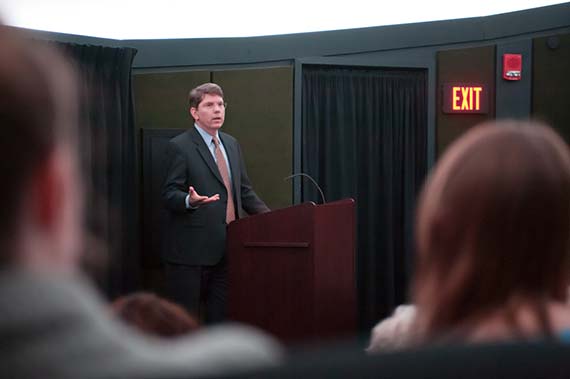Provost Doug Hicks shared his expertise on the connection between religious leadership and social change on Wednesday night in the Ho Tung Visualization Lab. Hicks focused on two monumental figures: Jesus Christ and Martin Luther King Jr., both of whom are featured portraits in the Great Minds Collection. The 29 large-scale, contemporary portraits — created by artist Robin Morris and on loan from Dick Resnick ’61, P’90 — inspired łÉČËÍ·Ěő’s lecture series that began in the fall.
Hicks started the discussion by asking, “What do we mean by religious leadership? Do we mean religious people, people who are themselves influenced by religion and go out to make social change? Do we mean leaders of religious institutions or people who are religious and are leading civil society, government, nonprofits, so forth?”
Martin Luther King Jr. is seen as a primarily political figure but nevertheless one who was greatly influenced by religion, Hicks pointed out. On the other hand, Jesus is seen solely as a religious figure, but also one whose actions have greatly influenced political and social movements.
Each had a religious identity that can be translated to a wider public and civic sphere. King was able to draw on religion as a backing for social change because, as Hicks noted, religion is so powerfully entwined in our social fabric. Jesus also transformed his community because of his convictions and is now the “leader” of a worldwide religious organization.
Recognizing that the use of religion for social change can also be problematic, Hicks said: “Political and social leaders … have claimed Jesus as a source of authority in order to justify their perceptions.” Even so, he added, leaders like King, who saw himself as a person of faith, called upon the work of Jesus as an “extremist for love.”
It is important to balance the religious with the political and put the narrative together, he asserted. Religious leaders can play multiple roles in social change, not just as figureheads, but also as grassroots organizers.
Hicks pointed to the fact that, even after their deaths, many people still follow the beliefs of King and Jesus. “How do we think about leaders whose thought remains, and yet they are deceased?” He encouraged the audience to consider the sacrifices these leaders had to make for their cause: most importantly, giving up their lives.
Hicks’s scholarship focuses on leadership, religion in politics and the workplace, and the ethical dimensions of economic issues. Before coming to łÉČËÍ·Ěő, he was professor of leadership studies and religion at the University of Richmond. In addition, Hicks is an ordained minister in the Presbyterian Church.
